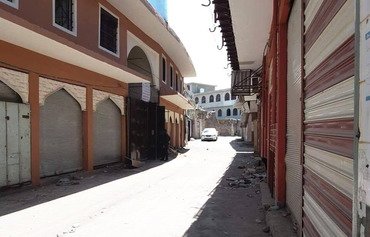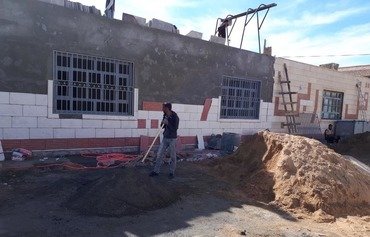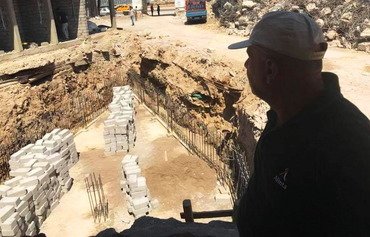Work is under way in cities across Iraq to rehabilitate schools, hospitals, shopping centres and other infrastructure that has been damaged by the "Islamic State of Iraq and the Levant" (ISIL).
The Iraqi government on January 14th announced the start of work to reconstruct and reinforce al-Hadi Shopping Centre in Baghdad's al-Karrada district, which was heavily damaged in a deadly July 2016 suicide bombing .
The attack, claimed by the "Islamic State of Iraq and the Levant" (ISIL), occurred when the bomber detonated a minibus packed with explosives near the crowded shopping centre in al-Karrada al-Sharqiya area.
The blast killed 292 civilians and wounded more than 200, and has been described as one of the deadliest single attacks in Iraq in more than a decade.
Reconstruction work is being overseen by a committee headed by the Baghdad mayoralty, which includes representatives of several government ministries and the Iraqi Economic Council, a non-governmental organisation.
"The reconstruction and making of hope is our response to all ISIL's crimes," the mayoralty's director of public relations Hakim Abdul Zahra told Diyaruna.
The goal is to restore the mall and "return it to its former glory, to be crowded with shoppers again", he said.
The committee responsible for monitoring the reconstruction process, chaired by Baghdad trustee Zikra Alloush, first conducted an extensive study to assess the extent of the damage to the building, Abdul Zahra said.
"After the completion of this step, the restoration work began, and will include the strengthening of the foundations and structure of the building," he said, as well as equipping it with public utilities and security systems.
The government has allocated 500 million Iraqi dinars ($422,654) to the reconstruction project, which is likely to take six months, Abdul-Zahra said.
"There is fruitful co-operation between the government and the private sector," he said. "The terrorist massacres will not be erased from memory, but life will continue and we will reconstruct our country."
Medical services return in Mosul
Meanwhile, reconstruction efforts are under way in parts of Mosul which have been liberated from ISIL.
The government has been taking positive steps to rehabilitate public facilities and to meet the needs of residents, particularly in the health and education sectors, Ninawa provincial council services committee member Hosam Eddin al-Abbar told Diyaruna.
"Twelve health centres in eastern Mosul were rehabilitated and opened, including the centres of al-Samah, al-Intissar, Gogjali and al-Zahra," he said.
"The rehabilitation of al-Hamdaniya General Hospital also is complete, and it began providing treatment services to the residents, in addition to Ibn al-Atheer hospital, which specialises in children's health," he said.
"As for al-Salam hospital, which is one of the largest hospitals in Mosul, there is a team from the Ministry of Health which began to assess the damage in preparation for reconstruction," al-Abbar said.
School attendance has resumed in 100 schools within Mosul's liberated areas after their restoration was completed, he said, adding that most of these facilities did not sustain major damage.
"So far, 25,000 male and female students, along with 13,000 teaching staff have resumed attendance," he said.
Ninawa's education department has begun providing students with books and stationery, al-Abbar said, adding that four large trucks loaded with supplies recently arrived in the city.
"Reconstruction campaigns begin directly as each region or neighbourhood is liberated, and the wheel of construction will not stop," he said.
Rapid reconstruction in Ramadi
The Anbar province city of Ramadi, which was liberated from ISIL in December 2015, also is undergoing rapid reconstruction.
"Ramadi was the city in the country most hurt by terrorism," Anbar provincial council member Farhan al-Obeidi told Diyaruna.
But now the local and federal government, along with various international organisations, are engaging in vigorous work for the reconstruction and repair of service projects blown up by ISIL, he said.
"There are 50 projects for the disposal of sewage and the treatment of drinking water that were restored to work in Ramadi, including the main water compound in the city," al-Obeidi said.
The Ministry of Migration and Displacement has rehabilitated 30 of the city's schools, with help from the Reconstruction Fund, and has restored Ramadi's General Hospital, he said.
An additional $90 million has been allocated for the reconstruction of bridges blown up by ISIL, including Palestine bridge and the Japanese bridge.
"The reconstruction movement is fast. Markets and public centres in the city are pulsing with life," al-Obeidi said.
Elsewhere in the country, areas reclaimed from ISIL are returning to life.
"Five months after the liberation of our city (in March 2015), I returned from displacement to my house, which was not damaged very much," said Mohammed al-Ajili, a resident of Tikrit in Salaheddine province who owns a clothing shop in the old market.
"I returned to open my shop, and shopping traffic was almost non-existent back then," he told Diyaruna. "But now everything is back to normal, and people are shopping and living their lives safely."
"The ordeal is over," he said.

![A bulldozer removes the rubble left behind by a July 2016 suicide bombing that hit al-Hadi Shopping Centre in Baghdad's al-Karrada district. The Iraqi government is working to rebuild the shopping centre. [Photo courtesy of the Iraqi Economic Council]](/cnmi_di/images/2017/02/13/7211-Iraq-Baghdad-Karrada-600_384.jpg)






